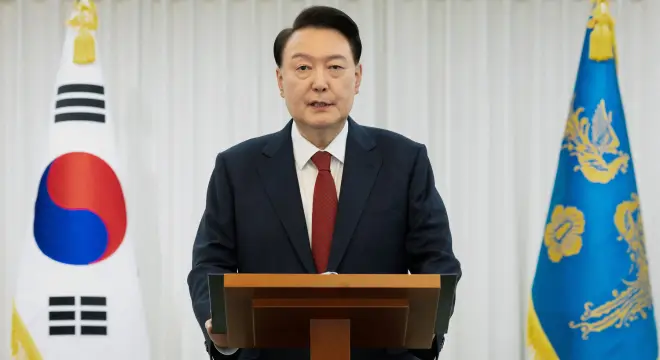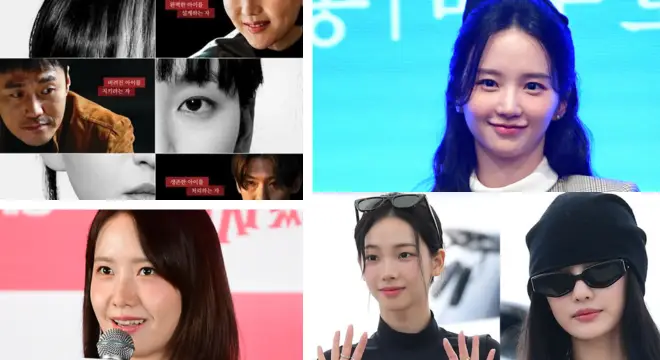|
Getting your Trinity Audio player ready...
|
South Korea’s former president Yoon Suk Yeol appeared before prosecutors on Wednesday after a court issued a warrant authorizing investigators to compel his attendance. The questioning marks the first time in three months that the detained ex-leader has met investigators since his July 10 arrest on charges of attempted insurrection, abuse of power, and violation of military law.
A Voluntary Appearance Under Pressure
According to the special counsel team led by Cho Eun-suk, Yoon arrived at the Seoul High Prosecutors’ Office just hours before officials were scheduled to execute the warrant at the Seoul Detention Center in Uiwang, Gyeonggi Province. Prosecutors said they had planned to bring Yoon in forcibly at about 8 a.m., but he informed correctional officers at 7:30 a.m. that he would cooperate voluntarily.
Assistant Special Counsel Park Ji-young told reporters that “the warrant was not executed because the former president agreed to appear on his own.” Yoon’s legal team later said the decision was made “to avoid burdening detention-center staff” and to demonstrate his willingness to comply with legal procedures.
Ignored Summonses and a Pending Trial
Yoon’s appearance came after he ignored two summonses issued on September 24 and 30, citing alleged procedural flaws. The court-approved warrant on October 1 authorized investigators to compel him to testify if he failed to cooperate again.
He has remained in custody since his second arrest this summer for allegedly misusing presidential authority during the closing months of his administration.
Separately, Yoon is also on trial at the Seoul Central District Court for abuse of power, with his first hearing held on September 26. His request for bail was denied in late September.
Allegations of Martial-Law Plot and Drone Operations
At the center of the investigation are accusations that Yoon tried to impose emergency martial law in December 2024 and ordered a “provocative drone operation” over North Korea two months earlier.
Investigators believe the drone flights—allegedly directed by then-Major General Kim Yong-dae of the military’s Drone Operations Command—were intended to provoke Pyongyang into retaliation, thereby creating a justification for declaring martial law inside South Korea.
The special counsel team is examining whether these actions could constitute treason or insurrection under the nation’s criminal code. If proven, the offenses carry sentences ranging from long-term imprisonment to life confinement.
The Special Counsel’s Investigation
Special Prosecutor Cho Eun-suk was appointed earlier this year after the National Assembly approved an independent probe into Yoon’s alleged martial-law attempt and other irregularities tied to emergency powers.
Her team has questioned more than 40 witnesses, including senior military officers and former cabinet members, to determine whether Yoon issued direct orders bypassing the Ministry of National Defense and the Joint Chiefs of Staff.
During Wednesday’s session, prosecutors confirmed that Yoon exercised his constitutional right to remain silent. Park Ji-young noted that the questioning might continue for a second day and that the warrant could still be executed if Yoon refuses to participate further. “The possibility of physical detention remains open,” Park said.
Legal Team’s Objection
Yoon’s lawyers released a detailed statement condemning the special counsel’s actions as “unlawful and politically motivated.”
They argued that the counsel requested the arrest warrant “without prior consultation” with the defense and that the process violated due-process guarantees.
They further claimed that the investigation into foreign-exchange irregularities—which the special counsel combined with the martial-law case—had already been addressed in previous sessions, calling the new summons “a duplicate and coercive investigation.”
According to the defense, detention officers allegedly approached Yoon early Wednesday “before he had even finished washing his face,” prompting him to appear voluntarily rather than subject the officers to procedural strain.

Related Developments: Warrant Rejected for Former Minister
In a related ruling, the Seoul Central District Court rejected the special counsel’s request to detain former Justice Minister Park Sung-jae, accused of helping draft the martial-law declaration.
The court said there was insufficient evidence and no risk of flight or destruction of evidence to justify detention.
Park Ji-young stated that while the team “respects the court’s decision,” it finds the reasoning “difficult to accept” given the former minister’s rank and responsibilities. The special counsel is considering reapplying for the warrant after reviewing the court’s findings.
Legal analysts noted that the dismissal could slow the investigation’s momentum, as Park Sung-jae was considered a key intermediary between Yoon’s office and the military command. The ruling follows the earlier release of ex-Prime Minister Han Duck-soo, another figure questioned in the same probe.
Broader Political Context
Yoon Suk Yeol, a former prosecutor general, was elected president in 2022 and impeached by the National Assembly two years later amid escalating political polarization. His administration had faced multiple controversies involving media control, anti-corruption reforms, and national-security policy toward North Korea.
The latest proceedings deepen the country’s political divide. Supporters of Yoon view the case as retribution by political rivals, while critics argue that no individual should be above the law.
Major newspapers in Seoul described Wednesday’s voluntary appearance as “a symbolic turning point” that will test both the independence of the judiciary and the resilience of South Korea’s democratic institutions.
What Comes Next
The special counsel team has indicated that it aims to conclude questioning within this week, then decide whether to indict Yoon on treason and insurrection charges or transfer the case to the Supreme Prosecutors’ Office for further review.
If indicted, Yoon would become the third South Korean head of state to face criminal prosecution after leaving office, following Chun Doo-hwan and Roh Tae-woo in the 1990s and Park Geun-hye in 2017.
Observers say the outcome will hinge on whether investigators can produce documentary proof or witness testimony showing that Yoon personally authorized the drone flights or drafted martial-law orders.
Any confirmed attempt to suspend democratic governance could carry profound consequences for South Korea’s constitutional framework and civil-military relations.
For now, Yoon remains at the Seoul Detention Center, awaiting the next phase of questioning. His legal team has reiterated that he intends to cooperate within “the bounds of due process” while maintaining his innocence.
Conclusion
The voluntary appearance of former President Yoon Suk Yeol represents an important moment in South Korea’s ongoing confrontation with the subjects of political accountability and the rule of law. His case has sparked debate about the extent of presidential power, judicial independence, and the limitations of political immunity in a democratic system.
While Yoon claims innocence and alleges political bias behind the investigation, prosecutors emphasize that the investigation is based on legal evidence and due process. As the special counsel approaches its decision on whether to charge him with treason and insurrection, the outcome will likely affect public confidence in South Korea’s criminal justice system and help to define the accountability of future administrations.
Regardless of the outcome, this case highlights a broader truth: in South Korea’s developing democracy, even the highest office in the nation is not immune from accountability.


